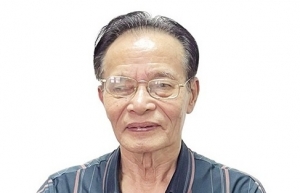More harmonisation advised for fiscal and monetary policy
Nguyen Ba Hung, principal country economist at the Asian Development Bank in Vietnam, told VIR that the Vietnamese government was now applying a loose monetary policy, but several issues had arisen.
 |
| A range of measures across the economy is being deployed to push production and business forward, photo Le Toan |
“The State Bank of Vietnam (SBV) has allowed a cap of 14 per cent in credit growth 2023. Meanwhile, the real demand for bank loans in the first seven months of this year increased only 5 per cent,” Hung said. “Local production remains weak and demand for loans is still limited. If production enterprises have weak demand for loans, the remaining credits offered will likely run into the securities and real estate sectors, and it may cause a property bubble.”
In the context of declining inflation and weaker growth, the SBV has loosened monetary policy since mid-March. At the end of the second quarter of 2023, discount and refinancing rates were set at 3 and 4.5 per cent, respectively, dropping by 150-200 basis points through a series of four policy rate cuts between March and June.
Caps on interest rates for deposits with maturities less than six months and lending rates for priority sectors were also reduced by the same magnitude to encourage commercial banks to provide new, cheaper loans to enterprises and individual customers.
Efforts were also made to accelerate implementation of the interest rate subsidy programme, as well as the introduction of a social housing credit initiative to support the economy.
“Monetary policy should go harmoniously with the fiscal policy, which currently has a big space to be implemented,” Hung said.
According to Hung, fiscal policy should focus on boosting public investment and cutting or reducing taxes for enterprises.
“The domestic economy’s growth now largely relies on domestic demand, in which the government still has significant fiscal space to boost public spending as a counter-cyclical measure,” Hung added.
“Currently, private consumption is facing the downside of the business cycle. Economic difficulties have forced consumers to tighten their belts, and businesses also have no opportunities to invest due to weak domestic and external demand.”
Thus, the government now can help boost private demand and consumption via its fiscal policy in which public investment plays a crucial role, Hung said.
He also added that to effectively carry out the fiscal policy, the government could increase borrowing given limited state budget revenues. At present, Vietnam’s public debt is standing at only 38 per cent of GDP, far lower than the warning limit of 55 per cent of GDP as permitted by the National Assembly.
Figures from the General Statistics Office showed that Vietnam’s total state budget revenues in the first seven months of this year were estimated to reach about $42.9 billion, down 7.8 per cent on-year due to an on-year reduction in revenues from the key sectors of the economy, such as domestic revenues declining by 4.1 per cent, crude oil down by nearly 20 per cent, and export and import activities falling by almost 23 per cent.
Total state budget expenditure in this period is estimated to sit at nearly $40.4 billion, up 13.7 per cent on-year. This reflected a budget surplus of $2.5 billion, which is not a good signal as while revenues reduced, spending increased.
According to Hung, Vietnam needs to focus on stimulating aggregate demand, which will in turn create employment and incomes, then more taxes will be paid.
Meanwhile, the World Bank in its economic outlook release two weeks ago stated that the country’s fiscal policy support should be accompanied by continued monetary policy accommodation, though the space for additional loosening is constrained.
“As credit demand has remained persistently low despite interest rate cuts, further reducing interest rates may not have the desired effect of incentivising credit growth,” the report said.
According to the World Bank, given ample fiscal space, the fiscal policy should take the lead, ensuring a much better implementation of the investment budget for 2023. A full implementation of the planned investment budget would bring public investments to 7.1 per cent of GDP in 2023, up from 5.5 per cent planned in 2022, providing a fiscal impulse of 0.4 per cent of GDP to support aggregate demand.
The government has planned an on-year 38 per cent increase in public investment for 2023, equivalent to 1.6 per cent of GDP, as part of the Programme on Socioeconomic Recovery and Development. It is accelerating implementation, with disbursement of the public investment budget jumping by 43.3 per cent on-year during the first semester of 2023.
However, historical public investment implementation rates have been low in the recent past, for example reaching only 67.3 per cent in 2022.
 | Variables still at play in global monetary policy Le Xuan Nghia, director of the Business Development Institute and member of the National Financial and Monetary Policy Advisory Council, scrutinises the development prospects in Vietnam and around the world for the remainder of 2023 and beyond. |
What the stars mean:
★ Poor ★ ★ Promising ★★★ Good ★★★★ Very good ★★★★★ Exceptional
Related Contents
Latest News
More News
- Kurz Vietnam expands Gia Lai factory (February 27, 2026 | 16:37)
- SK Innovation-led consortium wins $2.3 billion LNG project in Nghe An (February 25, 2026 | 07:56)
- THACO opens $70 million manufacturing complex in Danang (February 25, 2026 | 07:54)
- Phu Quoc International Airport expansion approved to meet rising demand (February 24, 2026 | 10:00)
- Bac Giang International Logistics Centre faces land clearance barrier (February 24, 2026 | 08:00)
- Bright prospects abound in European investment (February 19, 2026 | 20:27)
- Internal strengths attest to commitment to progress (February 19, 2026 | 20:13)
- Vietnam, New Zealand seek level-up in ties (February 19, 2026 | 18:06)
- Untapped potential in relations with Indonesia (February 19, 2026 | 17:56)
- German strengths match Vietnamese aspirations (February 19, 2026 | 17:40)

 Tag:
Tag:




















 Mobile Version
Mobile Version